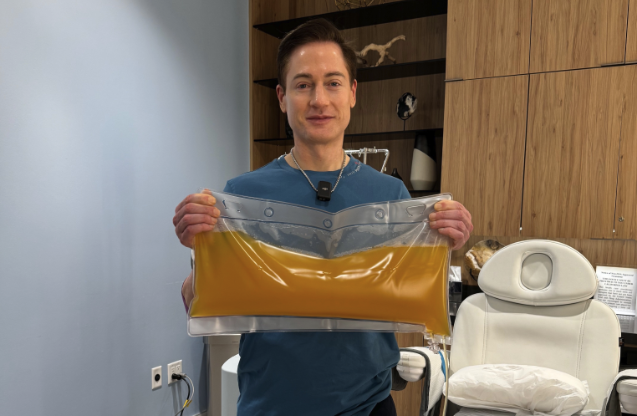Bryan Johnson, the 47-year-old tech mogul turned biohacker, has recently taken his already-extreme quest to reverse ageing to the outer limits. In a post this week on X, Johnson announced he had completed his first total plasma exchange (TPE), a procedure that removes all the plasma in his body and replaces it with albumin. “The whole procedure took just under two hours,” Johnson told followers, as casually as if he’d just had a routine dental cleaning.
This latest experiment marks an escalation from Johnson’s previous plasma-swapping endeavours, which involved exchanging one litre of plasma with his teenage son (he admitted the process wasn’t particularly successful). Now, he’s going all-in, replacing his entire plasma volume in a bid to purge “toxins” from his body.
Johnson’s pursuit of eternal youth has become increasingly outlandish over the past two years. He claims to spend on various procedures and chemicals intended to rejuvenate everything from his “baby face” to his adolescent-style penis. His regimen includes over 100 daily pills, intravenous infusions, and constant monitoring of dozens of biomarkers. It’s a far cry from the “ancestral lifestyle” peddled by the likes of the now-disgraced Liver King, who kept his steroid use a secret.
The tech millionaire’s latest plasma purge represents a new frontier in his anti-ageing crusade. TPE is typically used to treat serious medical conditions such as autoimmune disorders or organ transplant complications. Its application as an elective anti-ageing therapy remains highly experimental, with little scientific evidence to support its efficacy. But since when has a lack of evidence stopped a Silicon Valley disruptor?
Johnson seems undeterred by the absence of proven benefits. He’s forging ahead with characteristic zeal, tracking an array of biomarkers before and after the treatments. “We completed a bunch of baseline measurements before this therapy including toxins but other things too such as speed of ageing, organ ages, microplastics and many other biomarkers,” he noted.
It’s easy to dismiss Johnson’s exploits as the indulgences of an eccentric millionaire with too much time and money on his hands. His quixotic quest to achieve immortality through hyper-aggressive medical interventions can seem absurd, even darkly comical. Yet there’s an argument to be made that we need someone like him to push the boundaries of what’s possible in human longevity research.
His experiments echo those of earlier biohackers like steroid pioneer Dan Duchaine, who operated on much smaller budgets and well outside the bounds of legality. Some of their discoveries, such as steroids and creatine for strength-building, went on to become the backbone of major industries like testosterone replacement. Johnson, with his vast resources and willingness to try almost anything, could potentially accelerate similar breakthroughs in anti-ageing science.
Unlike the “Sol Brah” types popularising “ancestral” lifestyles or steroid-fuelled frauds like Liver King, Johnson is at least attempting something genuinely novel. The value may not be in the specific interventions he’s trying, but in the data he’s generating and the boundaries he’s pushing.
Of course, we should maintain a healthy scepticism about Johnson’s innumerable interventions. He advocates everything from basics like healthy eating and exercise to literally draining his own son’s plasma. There’s also the question of accessibility. Johnson’s multi-million-dollar anti-ageing regimen is so far beyond the means of average people that any potential benefits seem largely academic. Even if his experiments yield genuine longevity breakthroughs, they’re likely to remain the exclusive domain of the ultra-wealthy for the foreseeable future. It’s hard to imagine a future where your local pharmacy offers total plasma exchange alongside Big Pharma cash cows like flu and Covid jabs.
While he may not find the fountain of youth, Johnson’s monomania forces us to confront profound questions about human lifespan and the extremes we’ll go to in order to extend it. Even at its worst, it’s a masterclass in well-funded lunacy.











Join the discussion
Join like minded readers that support our journalism by becoming a paid subscriber
To join the discussion in the comments, become a paid subscriber.
Join like minded readers that support our journalism, read unlimited articles and enjoy other subscriber-only benefits.
Subscribe